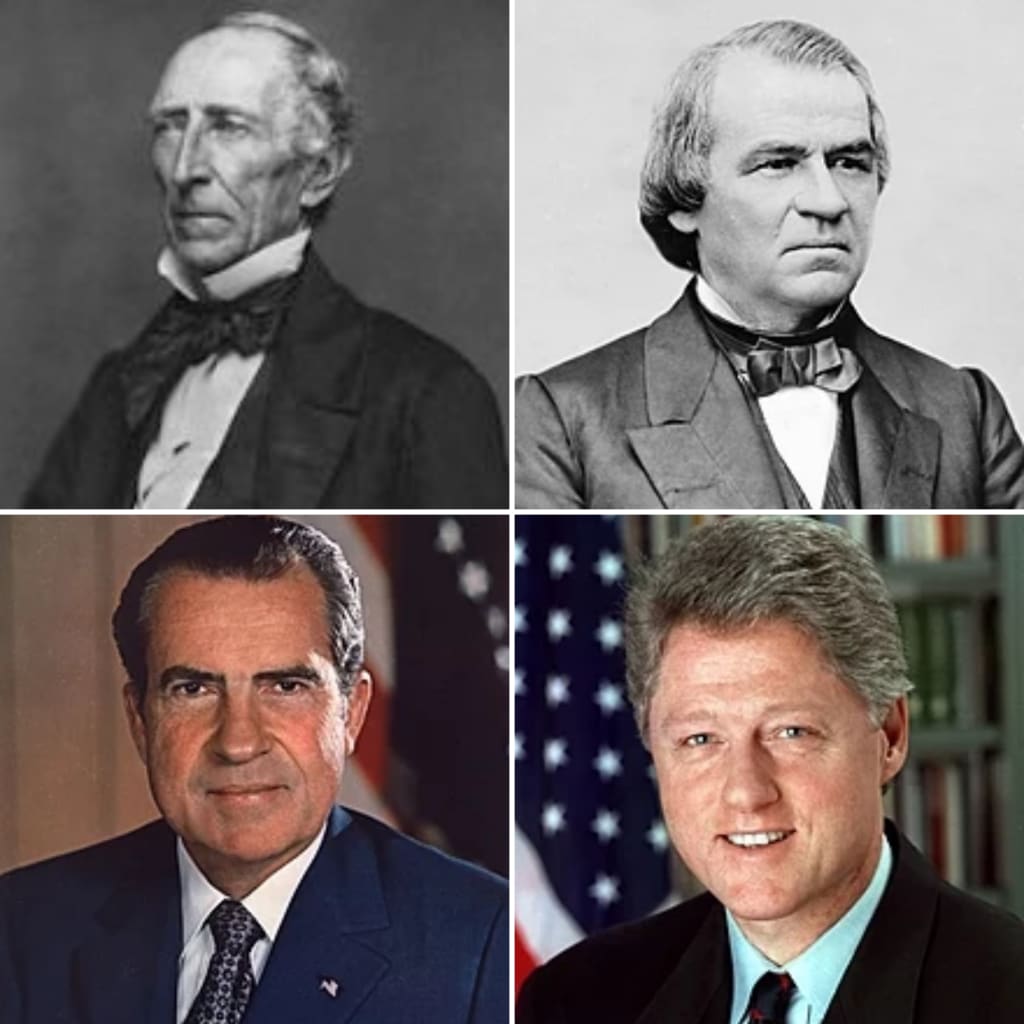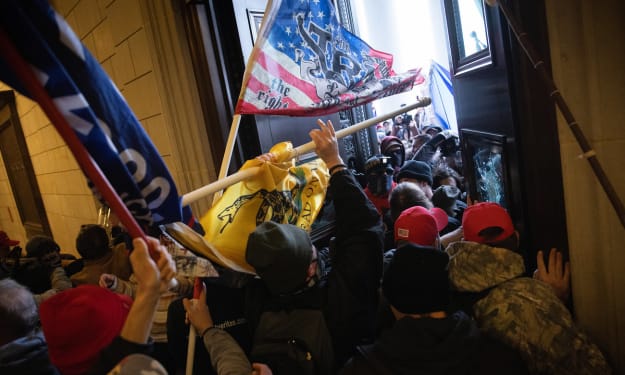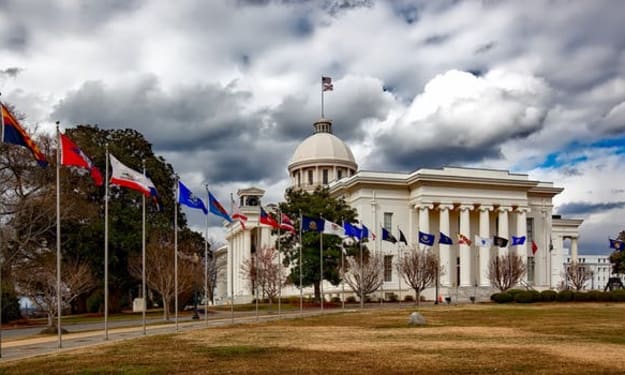"Rendered Himself Obnoxious" Is Impeachable?
A History of Impeachment in the United States

Written throughout the Constitution of the United States are checks and balances on power between the three branches of government. In theory, this balance of power ensures that the country will remain stable and resist the threat of losing the freedom and democracy that many Americans cherish. The power of impeachment is one such check.
“The President, Vice President, and all civil Officers of the United States, shall be removed from Office on Impeachment for, and Conviction of, Treason, Bribery, or other high Crimes and Misdemeanors.”—Article Two, Section Four of the United States Constitution
More than two hundred years after the writing of this document, many may wonder what that means and how it applies in a real world situation. Impeachment can occur at the state or federal level; however, this article will only cover federal.
As stated above in article two, section four, “The President, Vice President, and all civil Officers” can be impeached. While little ambiguity exists in the first two terms, “all civil Officers” is left up to interpretation. Most agree that federal judges, cabinet members, administrators, and commissioners fall under the term, but many of the lower members within the executive branch do not. Generally, if the position is appointed by the president or the head of an agency, the person can be subject to impeachment.
Almost seventy judges, four vice presidents, thirteen presidents, and dozens more cabinet members and other civil Officers have been the subject of impeachment investigations. The vast majority of these have led nowhere, others have led to resignations, and some have led to removal from office. Opponents of George Washington even shouted for impeachment over the Jay Treaty, which, among other things, aligned the United States more with England and less with France.
To be impeached, individuals need to have committed “Treason, Bribery, or other high Crimes and Misdemeanors.” While treason and bribery are fairly straightforward and defined, high crimes and misdemeanors are not. The phrase can be found in centuries old documents, and it had a far more standard meaning at the time of the drafting of the Constitution than the present time. First the word “high:” This is in reference to the position that the individual holds, and not to the act itself. Due to the additional responsibility held by people in “high” positions, actions that may not even be illegal can still qualify for impeachment. Benjamin Franklin believed that impeachment was appropriate for when the executive “rendered himself obnoxious” and advocated for "regular punishment of the Executive when his conduct should deserve it, and for his honorable acquittal when he should be unjustly accused" (“Constitutional Grounds”). Today the ambiguity of the phrase leads to countless arguments over what is, and what is not an impeachable offense.
As there is a bicameral legislature in the United States, both Houses of Congress partake in the proceedings. First, a member of the House brings a resolution for impeachment to the floor and it is voted on. If the resolution passes, the ensuing investigation is passed to the proper committee, usually the House Judiciary Committee, but it can differ depending on the circumstances. If the committee does not find adequate evidence to support the initial claim, the case is dropped and the process ends. Many proceedings have ended in this way. If the committee finds adequate evidence, it brings its Articles of Impeachment to the House floor. If this were a criminal trial, these articles would be the separate charges brought against the accused. A simple majority is all that is needed to pass the articles. If they are passed, the defendant has been “impeached.”
This important step in the process is why so many resolutions have made it to the House floor, but so few office holders have actually been impeached. Former President Richard Nixon is a prime example of this, as will be discussed later. Only nineteen federal officers have ever been impeached since the start of the country in 1789.
Once the House has formally begun the impeachment process, the Senate’s portion begins. Originally, the entire Senate would hear impeachment proceedings, but to increase the efficiency of an already slow moving arm of the government, that changed to Impeachment Trial Committees. These are the members of the Senate who hear the case. The trial itself consists of members of the house, or Managers, who act as the prosecution, the defendant, who may have an attorney, the Impeachment Trial Committee who oversee the proceedings, and a presiding officer. Generally, the presiding officer is the President of the Senate, who is also the Vice President, but in cases of Presidential impeachment, that honor falls on the Chief Justice of the Supreme Court.
The Managers present the case of the prosecution, calling witnesses, presenting evidence, and cross examining the defense witnesses. The Defendant’s side does the same. Once all the evidence and witnesses have been presented, the Impeachment Trial Committee takes all the evidence back to the Senate and they vote. A supermajority, or two-thirds, needs to vote for impeachment for the individual to be convicted. A conviction leads to immediate removal from office. Afterwards, if the Senate chooses, the defendant may also be barred from holding any public office again. Depending on the charges, the defendant may be prosecuted in a criminal case elsewhere, but the purview of an impeachment is simply removal from office.
As stated earlier, impeachment has led to many different outcomes. Below are seven interesting cases to help illuminate the scope of the proceedings.
Judge John Pickering
A Harvard graduate, Judge Pickering practiced law and held many high offices before and after the formation of the United States, including, but not limited to, a member of the New Hampshire House of Representatives, the New Hampshire convention to ratify the constitution, and Chief Justice of the New Hampshire Superior Court of Judicature. Appointed in 1795 by President George Washington to the United States District Court for the District of New Hampshire, Judge Pickering served for nine years before he was impeached on charges of drunkenness and unlawful rulings. The proceedings started in February 1803 and concluded in March 1804. The senate ruled 19-7, which immediately removed him from office.
President John Tyler
The tenth President of the United States was the first to have an impeachment resolution brought to the floor. Former President John Quincy Adams (Whig) sought impeachment due to Tyler’s use of the presidential veto on a tariff bill. Though far more common today, presidential vetoes at the time were primarily used when the constitutionality of the bill was in question, and not based on the policy included in the bill. This move, which President Andrew Jackson was famous for, infuriated Congress because they saw it as the President trying to legislate.
On July 10, 1842, Adams brought the impeachment resolution to the floor. In August of the same year, the House endorsed Adams’ committee’s report. The House was unable to continue impeachment proceedings, because the Whigs lost control of the House in that election. The impeachment proceedings stalled there and were never resumed.
President Andrew Johnson
When President Abraham Lincoln was assassinated, then Vice President Andrew Johnson assumed the position and title of Acting President. At the time, no specific laws or rules were set in place to define who became president if the current president should pass. This, along with Johnson’s completely different approach to post-Civil War America, put him at odds with Congress. Led by Radical Republicans, Congress took a hardline approach to bringing the rebel states back into the Union and tried to honor Lincoln's memory by providing the former slaves with rights. Johnson maintained some control over the Reconstruction effort through his management of the military, but his Secretary of War, Edwin M Stanton, was a Radical Republican that he found difficult to work with. In an effort to completely thwart Johnson's endeavour, Congress enacted the Tenure of Office Act, ensuring that Johnson could not appoint a new Secretary of War without congressional approval. While the Act was later repealed, and was most likely unconstitutional to begin with, it prevented Johnson from legally appointing a new cabinet member. He did it anyway.
After a series of maneuvers by Johnson, the House brought up eleven articles of impeachment, the vast majority focusing on his violation of the Tenure of Office Act. The trial turned out to be such an anticipated spectacle that tickets were sold daily to the Senate Chamber Galleries. Johnson, on advice from his counsel, did not attend the trial. Johnson and his attorney were given little time to prepare, however, one key witness may have turned the trial in their favor. Tyler offered the position of Secretary of War to multiple people, including General William T. Sherman. The prosecution expected Sherman to testify that Johnson wanted him to obstruct Congress, but Sherman testified that Johnson simply wanted him to manage the department well.
Some senators also questioned the constitutionality of what their more radical comrades were doing. They feared that a guilty verdict would undermine the office of the President and therefore the balance of power. Sherman’s testimony, coupled with the unease of those Republican senators brought an acquittal by one vote on some of the articles. Some attest that bribery also played a part in the vote. The Radical Republicans delayed the vote on the remaining articles in the hopes that they could change the minds of those who voted for acquittal. The ten day recess did nothing to sway their opinions. The decision set the precedent that Presidents cannot be impeached over a difference in policy or in the administration of duties with Congress.
Judge Robert Wodrow Archbald
In a vote of 223-1, the House voted to bring thirteen articles of impeachment against Judge Robert Archbald to the Senate. The articles centered around bribes, gifts, and corruption in the railroad and coal industries. Among other things, he was accused of jury tampering, taking gifts, including a 1910 trip to Europe, and coercion of various parties to make money. Not only did Archbald take the stand, a first in impeachment proceedings, but so did his wife, explaining that the trip was really just a gift from her railroad executive cousin. Archbald insisted that these were not bribes, but merely gifts from friends that he had grown over the years of working in the community.
On January 13, 1913, the Senate convicted him on five of the thirteen articles and gave him the harshest sentence available: removal from office and barring from serving or holding office again. Even after his conviction, he insisted that he had done nothing wrong. Judges in Lackawanna County insisted that he was an upstanding judge and exactly what you would "want in a common pleas judge" (Leffler).
Vice Consul General Oliver B Bradford
Assigned to Shanghai as the Postal Agent of the United States, Oliver B. Bradford was accused of embezzlement, fraud and numerous other charges related to the building of the Cross China Railroad. On May 22, 1878 ten articles of impeachment were brought against him by the House; however, two of the senators on the committee dissented. They argued that the office held by Bradford was not high enough to qualify for impeachment, despite the fact that they were convinced that he would be convicted on the evidence they had against him. The question was sent to the House Judiciary Committee for a decision. Bradford was not impeached.
President Richard Nixon
One of the most infamous names in twentieth century American history, Richard Nixon’s name is almost synonymous with the Watergate scandal. On the night of June 17, 1972, five burglars broke into Democratic National Headquarters in the Watergate Building Complex to find compromising material on their political opponents. The conspiracy, which brought much negative attention to the Nixon administration, centered around the ensuing cover up, but the term Watergate has come to encompass all of the questionable actions taken by the administration, including the bugging of opponent’s phones.
In all, 69 people were indicted in the ensuing investigation, however, Nixon was not among them. He was labeled as an “unindicted co-conspirator” (Black 2007, 974) because Congress ruled that sitting Presidents could not be indicted. That left them with only one recourse: impeachment. The House voted to investigate in late 1973 and the investigation began in early 1974. As more and more evidence surfaced, including the infamous tapes, it was obvious that the members on both sides of the isle of the House would vote to impeach. Once his staff made it clear to Nixon that the House would almost certainly vote to impeach him and that the Senate would likely find him guilty, he resigned. On August 8, 1974, Nixon went on television to announce his resignation to the American people. It took effect the following morning.
The impeachment proceedings ended with Nixon’s resignation. Since the House as a full body did not vote to have him tried by the Senate, Nixon was not technically impeached. He resigned immediately before this would have occured. As he was no longer in office, it would have allowed criminal courts to file charges at both the state and federal levels. On September 8, 1974, the newly sworn in President, Gerald Ford, pardoned him, preventing any cases to be brought against him for actions he took as president.
President Bill Clinton
The first president to be impeached in over one hundred years, Clinton was one of the subjects of an investigation by Independent Counsel Kenneth Starr. Originally, the investigation focused on the Whitewater Scandal but Starr began investigating the sexual harassment charges filed against Clinton by Paula Jones. During the course of this investigation, Clinton made some truthfully questionable statements under oath in regards to an intern named Monica Lewinsky. Once her name appeared on the witness list, the Starr Report (the finalized report released by Kenneth Starr) indicates that Clinton started covering up the extent of their relationship.
On December 19, 1998, Clinton was impeached by the House. Two of the four articles of impeachment passed, outlining perjury and obstruction of justice as the crimes to which he needed to answer. The senate trial began on January 7, 1999. On February 9, the Senate deliberated and came back with a judgement. Neither article received the necessary two thirds majority and he was acquitted of both charges. A federal judge did cite Clinton for contempt of court for his dubious testimony, which resulted in a plea deal ensuring no criminal charges would be filed, a temporary suspension of his Arkansas Law license, and a fine of $25,000.
Current Day
To date, two presidents have been impeached but neither removed from office. Of those nineteen federal officers who were officially impeached, only eight were convicted, all of whom were judges. Impeachment remains a lengthy, rarely used procedure, despite the fact that every one of the presidents elected since 1980 has had a Representative suggest impeachment.
Almost since his election in 2016, the news has been filled with headlines about the impeachment of President Donald Trump with opinions generally divided straight down party lines, but the recent whistleblower complaint has lit a new fire beneath House Democrats. House Speaker Nancy Pelosi has given the House Intelligence Committee the authority to investigate the whistleblower complaint in regards to impeachment. “Right now it is quite narrow. It is focused specifically on the complaint filed by the whistleblower, and the documents that the president has released,” said Democratic Jackie Speier of the House Intelligence Committee. However, “That may not be the end of it.” They plan to conduct many interviews, but hope to have it finished by the end of the calendar year with the purpose of determining “whether the president is using his and violat(ing) the law,” (Martin). Many Republicans accuse the Democrats of creating problems for the purpose of removing the President from office. In an interview with NPR Tennessee House Republican Andy Barr stated, “This is a case of democrats careening from one baseless impeachment theory to the other,” (Martin).
How deep will the investigation go? Will they conclude by the new year? Some say that the facts before the American people are already enough to convict. During the Clinton impeachment, the House saw no need to investigate further as they had the Starr Report available. With the country so divided, similar to the Watergate scandal, it is likely that a full inquiry will commence.
Nothing is certain at the moment. Will the investigation reveal information that will change stubborn minds on either side of the isle? If he’s impeached, will he be convicted? If he’s convicted, will he be barred from serving again? Will the proceedings take longer than Democrats hope and last until after the 2020 election? Will the trial last into his second term? Will he be voted out before the house concludes its inquiry? If he is, Trump could be yet another name to add to the long list of officials who were almost impeached.
Update:
Though impeached in the House, the Senate did not remove Donald Trump from office. He will now go down in history as the first US president to be impeached twice though. While the first impeachment was along party lines and ended with an acquittal, this second impeachment seems to have more bipartisan support.
Though facts are still being gathered about the events of January 6, 2021, the evidence shows that some of the rioters who stormed the Capitol Building had hostile intentions towards members of Congress and also planned to disrupt the proceedings to certify the election results. The article of impeachment charges Trump with “incitement of insurrection” (House articles). In an encouragingly bipartisan move, ten Republicans voted to impeach President Trump, a move more bipartisan than any previous impeachment vote (“222 Democrats, 10 Republicans). Of those ten Republicans, the third highest ranking member of the House, Liz Cheney, voted for impeachment. She called Trump’s actions the “greatest betrayal” of a US President ever. This could indicate that the Senate would also be more bipartisan. Thus far, Senate Minority Leader Mitch McConnell has not indicated where he will vote but has vividly condemned the acts of violence and the part that Trump has played in it. Mitt Romney is also likely to vote for impeachment as he did in the first process. Senator Lisa Murowski has also condemned Trump for his actions up to and including the storming of the Capitol Building along with other congress people.
Wednesday January 6, 2021 was a dark day for our country. The Senate will begin hearing arguments on February 8, 2021.
Bibliography
“222 Democrats, 10 Republicans Vote To Impeach Trump For A 2nd Time.” NPR. NPR, January 14, 2021. https://www.npr.org/2021/01/14/956705074/222-democrats-10-republicans-vote-to-impeach-trump-for-a-2nd-time.
Black, Conrad. Richard M. Nixon: a Life in Full. New York: Public Affairs, 2007.
Beschloss, Michael. “‘Impeach President Washington!".” AMERICAN HERITAGE. American Heritage Publishing Co, 2017. https://www.americanheritage.com/impeach-president-washington
Chitwood, Oliver Perry (1964) [Orig. 1939, Appleton-Century]. John Tyler, Champion of the Old South. Russell & Russell. OCLC 424864
Congress, US. “Congressional Record: Proceedings and Debates of the Congress, Volume 7, Part 7.” Google Books. Google. Accessed September 26, 2019. https://books.google.com/books?id=IP5RAQAAMAAJ&pg=PA3668&dq=Oliver+B+Bradford&hl=en&sa=X&ved=2ahUKEwiV0eLrgu_kAhVBC6wKHXjBDvAQ6AEwA3oECAQQAg#v=onepage&q=Oliver B Bradford&f=false
“Constitutional Grounds for Presidential Impeachment.” The Washington Post. WP Company, 1998. https://www.washingtonpost.com/wp-srv/politics/special/clinton/stories/watergatedoc_3.htm
Halstead, TJ. “An Overview of the Impeachment Process.” An Overview of the Impeachment Process. Congressional Research, The Library of Congress. Accessed September 26, 2019. http://congressionalresearch.com/98-806/document.php.
“Impeachment of President William Jefferson Clinton - The Evidentiary Record Pursuant to S. Res. 16 - Index to Senate Document 106-3, Vols. I-XXIV.” govinfo. govinfo, January 8, 1999. https://www.govinfo.gov/app/details/GPO-CDOC-106sdoc3/GPO-CDOC-106sdoc3-2
Leffler, Pete. “PENNSYLVANIA JUDGE TOOK WALK UP IMPEACHMENT HILL * ROBERT ARCHBALD'S FINANCIAL DEALINGS GOT HIM BOOTED FROM OFFICE.” themorningcall.com. The Morning Call, September 16, 1998. https://www.mcall.com/news/mc-xpm-1998-09-16-3208308-story.html
Martin, Rachel. “House Intelligence Committee Has Purview Over Impeachment Inquiry.” NPR. NPR, September 27, 2019. https://www.npr.org/2019/09/27/764970170/house-intelligence-committee-has-purview-over-impeachment-inquiry
“READ: The House of Representatives' Article of Impeachment against Donald Trump,” January 12, 2021. https://www.cnn.com/2021/01/11/politics/house-articles-of-impeachment/index.html.
Riley, Russell L. “Bill Clinton: Domestic Affairs.” Miller Center, July 11, 2017. https://millercenter.org/president/clinton/domestic-affairs
Roland, John. “Meaning of ‘High Crimes and Misdemeanors.’” Constitution Society: Everything needed to decide constitutional issues. Constitution Society. Accessed September 26, 2019. https://constitution.org/cmt/high_crimes.htm
Trefousse, Hans L. (1989). Andrew Johnson: A Biography. New York City: W. W. Norton & Company
Turner, Lynn W. (April 1949). "The Impeachment of John Pickering". American Historical Review. JSTOR 1843004






Comments
There are no comments for this story
Be the first to respond and start the conversation.